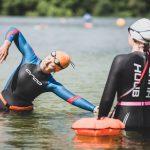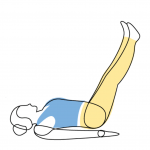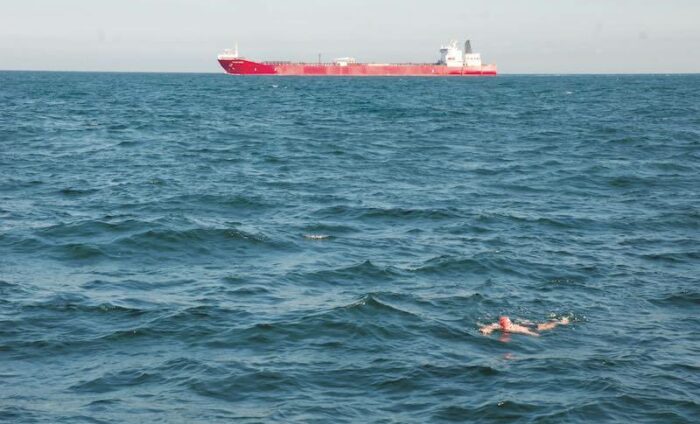
The pain of never
Jonathan Cowie swims with Jessica Hepburn, author of 21 Miles – swimming in search of the meaning of motherhood
It is not often you meet someone for the first time in the middle of the English Channel, especially when they are swimming across it. But that is how I first met Jessica Hepburn. I was crewing for my friend Kerry, who was also swimming the Channel. She had already successfully reached France and we were now sailing back to Dover. En route we crossed paths with another Channel swimmer’s support boat. “That’s Jessica!” shouted Kerry. And we waved and cheered as she swam past.
“You should interview her,” Kerry said. “Her story is really interesting.”
Which is why, three years later,
I am swimming a sedate heads-up breaststroke in the Serpentine lake
with the woman the Daily Mail dubbed as being “addicted to IVF.” Jessica’s unsuccessful struggle to conceive involved 11 rounds of IVF, miscarriage, an ectopic pregnancy and spiralling costs of £70,000. The pursuit of motherhood became an all-consuming obsession. And when she finally faced the fact that she wasn’t going to have her own biological children, she decided to swim the English Channel.
Her book ‘21 Miles – swimming in search of the meaning of motherhood’ is the story of that swim. At the heart
of the book is the question ‘does motherhood make you happy?’ To help her answer that question she met with 21 inspirational women to eat cake and discuss the meaning of motherhood. Why cake? As Jessica’s Channel training progressed she realised that she needed
to put on weight to insulate her from the cold.
“I don’t swim front crawl anymore,” says Jessica as we slowly breaststroke past The London Mastaba, a 20-metre- high sculpture by artist Christo floating opposite the Serpentine Swimming Club changing room. But breaststroke makes it easier to chat, and we swim towards the bridge
talking about love, loss and Channel swimming.
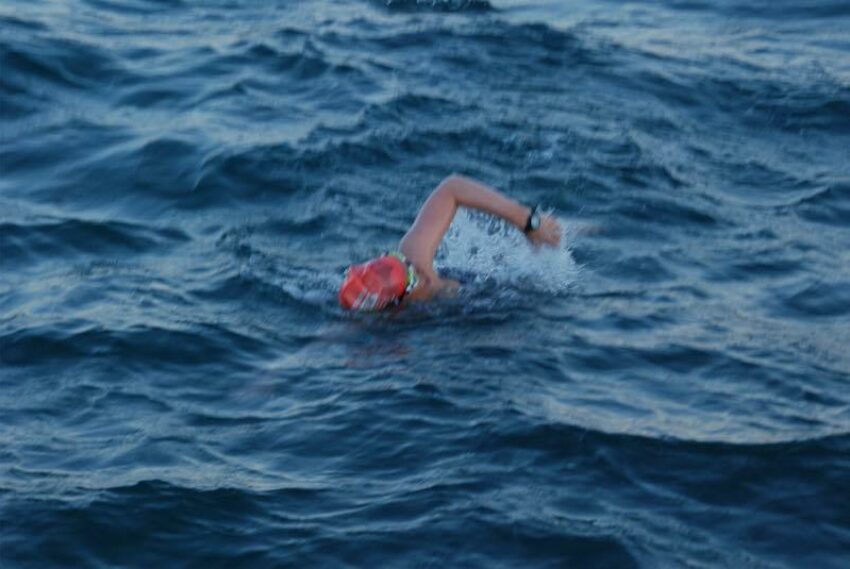
The pain of never
A week earlier 21
Miles launched at
Fertility Fest, the
festival of fertility
and modern families
that Jessica now runs in her new-found role as a commentator
on fertility, infertility and assisted conception. Six of the inspirational women Jessica had interviewed for the book were gathered on the stage for
a panel discussion, excitingly hosted by my favourite Blue Peter presenter Janet Ellis. I was there with my sister, whose own IVF journey had just come to the same unsuccessful conclusion (although I have yet to persuade
my sister to swim the Channel).
The evening started with Jessica reading a passage from her book about the pain of losing something you never had. “I call it the pain of never,” she writes, “and these are
its symptoms.” They include never being able to feel happy when a
friend announces her pregnancy without feeling sad for yourself,
never being invited to a christening without it hurting, never hearing anyone call you ‘Mum’. It is a long list. She writes: “If you’ve got them, you will know.” Next to me, my sister knows.
“The big thing of the book is that everyone has shit, everyone has bad stuff,” says Jessica as we sit having coffee at the Serpentine Lido café after our swim. “It is the human condition. Everyone has something. You just have to work out how to make up for that.”
And she made up for it by deciding to swim the Channel with no swimming experience and no knowledge of what was involved. “The Channel was so far from my existence,” she says. “I don’t even like exercise.”
We talk about big challenges, and
about whether succeeding at a challenge draws a line under your ‘bad stuff ’. ‘The Channel changed my life, but it didn’t
cure anything,” says Jessica. “It is still an ongoing thing. I think it did give me
some things that I wasn’t looking for. It opened me up to a world, this open water swimming world, the love of human beings.”
A significant age
These are words that resonate with
me. As we talk about challenges we discuss the ending of the book, which is ambiguous as to whether Jessica and her partner Peter split up. They did, and it draws some parallels with my own long-term relationship ending in my early forties. Similarly, I had been thinking about
a big challenge and
what that challenge
should be.
“It is often
about doing
something totally
different.” She
motions towards
the Serpentine
glinting in the sun.
“Like getting in here
and training was totally
outside my comfort zone,
my knowledge and my world and
that is what was so important. I would recommend that. Forty is a significant age. You start to realise that time is going to start running out.”
Jessica’s Channel journey started
with a phone call to swimming holiday company SwimQuest and a training camp in Formentera where she clung freezing to a rock after 10 minutes swimming breaststroke. It is at that moment that she realised swimming the Channel was something big.
“What was frightening about the Channel swim was that it wasn’t in my control. Channel swimming is not in your control, unlike a marathon. The brilliant thing about it was that luckily nature gave me this one but the other things it showed me and opened my eyes to were so important.”
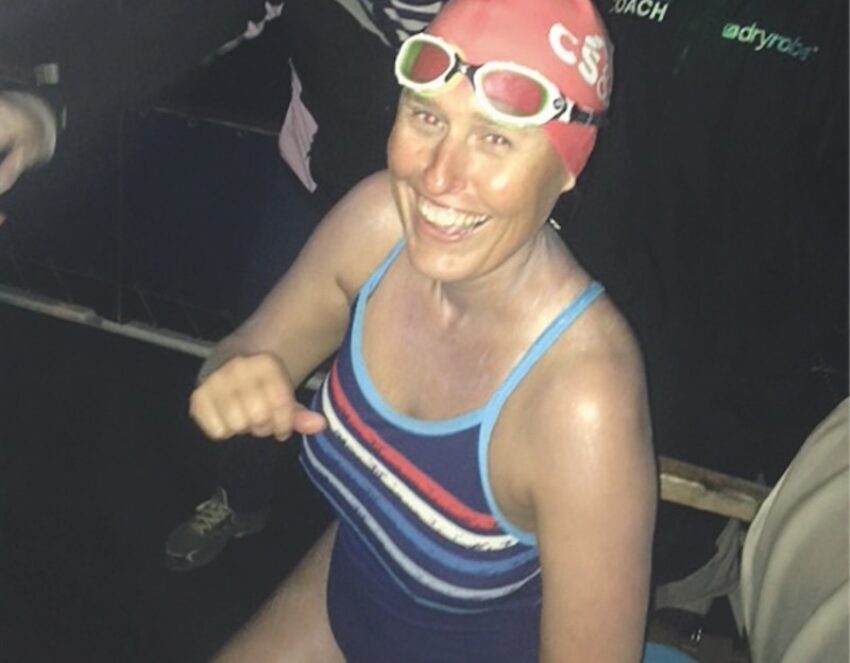
Jessica aboard her English Channel support boat, Optimist
One of those things was the outdoor swimming and Channel swimming community. But the support of that community was not always unwavering – she had her doubters, but one of the things I love about the book is how she just keeps going and proves everyone wrong: when she completes 100×100 metres at Camp Eton training camp and then does a few extra lengths, when she completes her six-hour qualifying swim under the eyes of John and Alice from
SwimQuest, a far cry from shivering on a rock after 10 minutes of breaststroke.
“I don’t recommend that most people go and do what I do, but then most people aren’t like me because they wouldn’t go through 11 rounds of IVF,” says Jessica. “I am clearly someone who does things to extremes. I am not saying that everyone should run out and do something big, or that doing something big will cure you of whatever you are running away from. But for me it gave me something else to focus on which was really important.”
It is the big question that everyone always asks, and that I struggle with myself: is a big challenge escaping
from your problems? “Are you running away from something or running to
something? It depends how you look at it and I choose to look at is as though I am running to something,” says Jessica. “As long as you are truthful to yourself and what you are doing then that is the important thing.”
Central to the book is the
question ‘does motherhood make
you happy?’ “Hopefully the
book answered other questions,”
says Jessica. “And one of them
was I think one of the reasons
that I wanted my own family
is because human beings need connections and family is a really quick way to connection. Realising that I wasn’t able to create that connection on top of losing the person who was the closest to me was tough.”
From my own personal experience, big challenges and the training regimes necessary for endurance sport can
put a great strain on relationships. By his request, Jessica’s partner is pretty much absent from the book, until his ambiguous reappearance in the final chapter. “Did my relationship break down because of the IVF? Or did it break down because of swimming the Channel? Relationships break down because of a multitude of reasons,” says Jessica.
She says swimming the Channel did give her what she was looking for and some things that she wasn’t looking
for. “You can create other connections with other human beings and that is important to our happiness and you have to be open to that. It was all these other things that it gave me that became the real important things.”
A good ride
On 2 September 2015, Jessica set
off from Dover. Seventeen hours 44 minutes and 30 seconds later she became a Channel swimmer. “It is always in me, I am taking it with me throughout my life,” she says. “It has enriched my life, it has made me a stronger person. You have to have the bravery to embrace change in life. Embracing change, even if it doesn’t bring you what you want, brings you other things. They can be glorious things.”
What next for Jessica? “Whether or not I become a mother in any way, the thing that drives me most is that when
I get to the end then I just want to be able to say ‘that was a good ride’. I am so driven: we haven’t got long here.”
In the final chapter of the book Jessica writes that “every single person in the world seems to have something that makes them terribly sad. And life
is about making the best of our sad thing.” I have met and interviewed lots of inspiring athletes, but Jessica is the only person I have interviewed who
has inspired me to confront my “sad thing”, to take on a challenge outside my comfort zone. Jessica’s next challenge involves a very big mountain. “I now want to learn about something new. The mountain is just for me: me climbing it, me feeling that strength.” And my big challenge? Watch this space…
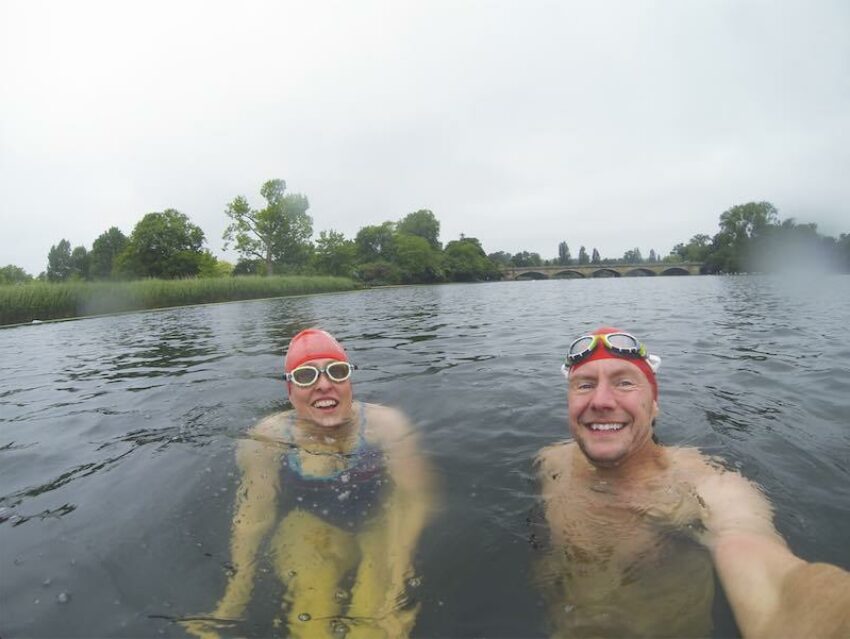
Jessica swimming with Jonathan in the Serpentine
21 Miles by Jessica Hepburn is published by Unbound, rrp £14.99






